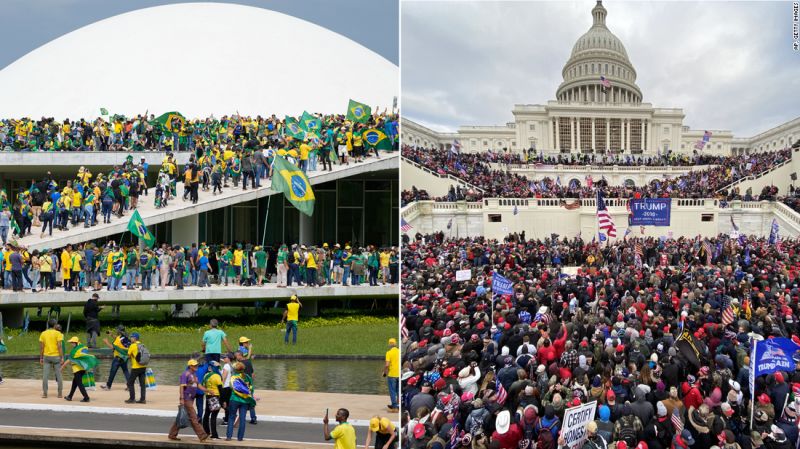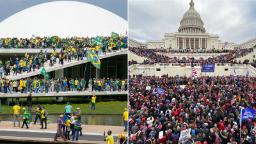

CNN
—
On the face of it, the mob storming of government buildings in Brazil in support of a defeated ex-president making false claims of electoral fraud looks like a copycat assault on democracy inspired by the US Capitol insurrection.
But for Americans, the reality of the comparison between the insurrection inspired by the 45th US president on January, 6, 2021, and the latest revolt by supporters of former Brazilian President Jair Bolsonaro, dubbed “Trump of the Tropics,” is even more troubling. Brazil is in turmoil after hundreds of Bolsonaro supporters stormed congressional buildings, the Supreme Court and the presidential palace in the capital Brasilia. The assault came a week after the inauguration of President Luiz Inacio Lula da Silva, who returned to power after a 12-year hiatus following a victory over Bolsonaro in a run-off election on October 30.
While many elements of the situation in Brazil overlap with the populist conservatism epitomized by former President Donald Trump’s inner circle in the US, it also poses the question of whether the US, under assault from its own anti-democratic movement, is beginning to resemble the political turmoil that has long raged in less stable regions of the world.
For now, there are growing questions over whether key extremists in Trump’s inner circle, like Steve Bannon, helped fan the violence in Brasilia and doubts over the Brazilian election, as part of a bid to destabilize democracies worldwide.
Bolsonaro did not explicitly provoke the gathering of protesters as Trump did, and was not in the country at the time of the riot. He did, however, adopt the Trump playbook, sowing doubt about the vote’s legitimacy, refusing to concede his election loss and profiting from disinformation spread on social media. But his behavior is not necessarily an outlier in a nation and a continent where democracy is perpetually fragile and at risk.
Brazil was a military-run dictatorship until 1985 after the crushing of an earlier attempt at democracy, and civilian self-government since then has often been rocked by corruption, fears of military takeovers and prosecutions of former presidents. The erosion of democracy and the use of violence as a political tool were a feature of much of the Western Hemisphere long before Trump latched onto them.
So, while it may look like Brazilian extremists are copying their brethren in the US, the world’s most important democracy could actually be importing the characteristics of malfunctioning and chaotic political societies abroad.
Violence had long been feared following October’s election. Bolsonaro supporters, spurred by his false claims of electoral fraud, that mirrored Trump’s own behavior after the 2020 election, clearly incited his supporters. Just as in the United States, there are elements among Brazilian legislators and in political power in the states who support Bolsonaro and his efforts to undermine democracy.
The new House majority in Washington is packed with Republican members who voted not to certify President Joe Biden’s election victory in 2020 based on false claims of ballot fraud. And the new Speaker Kevin McCarthy only finally won the job on a 15th ballot after an intervention from Trump – poignantly on the night that marked the second anniversary of Congress returning to work after the Capitol riot.
In other echoes of January 6, Bolsonaro – like his populist, nationalist political cousin Trump – is currently in Florida. Like the 45th US president, he also prepared to undermine the election in advance and refused to concede defeat after making complaints about voting machines that were rejected by judges. The closest he got was when he said he would comply with the Constitution.
So far, Brazil’s democracy, as America’s did two years ago, has held firm, and protesters have been flushed out of government buildings. But the Biden administration has been concerned from the start about the implications of Bolsonaro’s election denialism in a nation that is a political and economic fulcrum in Latin America. It warned publicly and in private, weeks before the election that then-President Bolsonaro should not sabotage democracy, clearly understanding the parallels with Trump and more broadly the dangers facing Brazilian democracy since the end of military rule in the 1980s.
Biden, who has put the threats to global democracy at the center of his foreign policy, condemned the assault on democracy and on the peaceful transfer of power in a tweet. “Brazil’s democratic institutions have our full support and the will of the Brazilian people must not be undermined,” Biden wrote. “I look forward to continuing to work with @LulaOficial,” he wrote, referring to the current president.
But the violence in Brazil came as a jolt after the last year in which democracy appeared to be making a comeback around the world, including in the United States where voters in some swing states rejected election denialism pushed by many of Trump’s political proteges in the midterm elections.
The most powerful example that Washington can send to Brazil, and other nations where political systems are under duress, is that democracy bent but didn’t break in 2021, and that those who threatened it are starting to be held to account.
But two dates, January 6 in the US and January 8 in Brazil, now stand as flashing warning signs that the health and survival of free elections anywhere cannot be taken for granted.
